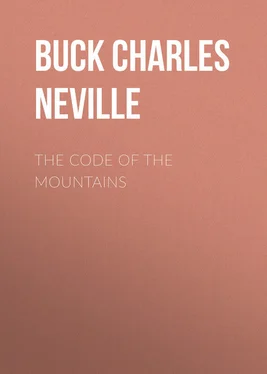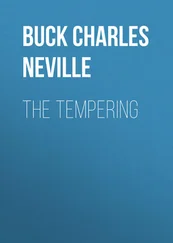Charles Buck - The Code of the Mountains
Здесь есть возможность читать онлайн «Charles Buck - The Code of the Mountains» — ознакомительный отрывок электронной книги совершенно бесплатно, а после прочтения отрывка купить полную версию. В некоторых случаях можно слушать аудио, скачать через торрент в формате fb2 и присутствует краткое содержание. Жанр: foreign_prose, foreign_antique, foreign_language, на английском языке. Описание произведения, (предисловие) а так же отзывы посетителей доступны на портале библиотеки ЛибКат.
- Название:The Code of the Mountains
- Автор:
- Жанр:
- Год:неизвестен
- ISBN:нет данных
- Рейтинг книги:4 / 5. Голосов: 1
-
Избранное:Добавить в избранное
- Отзывы:
-
Ваша оценка:
- 80
- 1
- 2
- 3
- 4
- 5
The Code of the Mountains: краткое содержание, описание и аннотация
Предлагаем к чтению аннотацию, описание, краткое содержание или предисловие (зависит от того, что написал сам автор книги «The Code of the Mountains»). Если вы не нашли необходимую информацию о книге — напишите в комментариях, мы постараемся отыскать её.
The Code of the Mountains — читать онлайн ознакомительный отрывок
Ниже представлен текст книги, разбитый по страницам. Система сохранения места последней прочитанной страницы, позволяет с удобством читать онлайн бесплатно книгу «The Code of the Mountains», без необходимости каждый раз заново искать на чём Вы остановились. Поставьте закладку, и сможете в любой момент перейти на страницу, на которой закончили чтение.
Интервал:
Закладка:
"It takes time," the man reassured her. "In the place of ignorance, we offer education. In the place of lawlessness, we offer law. In the place of squalor, we offer thrift. Are those things not worth what they cost?"
The girl stood silent for a moment, then nodded her head.
"I reckon so," she answered simply, and turned to leave the library. After she had gone, the teacher sat for a time with his book open before him, but his eyes were contemplative, and it was from memory and not from the printed page that he was reading.
He was thinking back and seeing over again a day shortly after his school had opened. In those times there had been fewer buildings, and of the many pupils who came, hungry to learn, only a few could be taken in. Among the first had been Minerva.
She had come exhausted and tired because she had come on foot, and her mean calico dress had been briar-torn, and her feet, which were bare, had been bruised. But in her eyes was gleaming a passion of hunger and resolve for the food which the school offered the mind. She had presented herself, a ragged little mendicant asking the alms of education, carrying what belongings she had in such a bundle as tramps carry.
Back in her unlighted and windowless cabin, she had heard of this "new-fangled" institution where was to be dispensed the pabulum of "larnin'" – and she had made her pilgrimage. Now Doctor Murray was recalling that day. He had been down by the stile which gave entrance from the creek-bed road, when he had seen the slight figure trudging along, and the girl had stopped and eyed him shyly.
"Air ye the feller frum down below what aims ter give folks larnin'?" she had demanded, as her large eyes held his with a tense directness, untinged by any humor.
"To give folks learning is a large contract," he had answered with a quizzical smile; "but we hope to give to as many as we can, at least its rudiments."
"What's them?"
"The start. Have you ever been to school at all?"
"I've done been ter the blab-school. I kin read an' write an' figger."
Dr. Murray had stood there looking at her, and it had come to him that she made a very pathetic picture, with the yearning in her eyes and the dust of travel on her calico, so he denied her with a heavy heart.
"Just now," he said regretfully, "we can only take in a few pupils and we are already over-crowded. I'm afraid we can't make room for you." Suddenly he added, "How far have you come?"
"The rise of twenty mile, sence sun-up," she informed him simply, then tears welled rebelliously into her eyes. Her voice broke from her lips with a fierce passionateness.
"Ye've got ter take me," she cried out. "Ye've jest simply got ter take me. I've done been prayin' ter God Almighty ter give me a chanst. I've done heerd that ye war a preacher of ther Gospel, an' I reckon God hain't a-goin' ter suffer ye ter turn me away."
Doctor Murray had then been new to the hills. The storm-like intensity of the mountain character was bringing him its revelations. He stood there by the road, watching the ox-teams that were bringing logs in to his saw-mill and made rapid calculations and as he did so he heard the new candidate for matriculation rushing on:
"Ther Scripters says thet God's servant won't turn away sich as comes to him seeking light – an' I've done come."
"At all events," he answered gently, "come up and have something to eat, and I'll talk it over with my wife."
Mrs. Murray had spent a half-hour with the girl, and then had come back to her husband.
"She is as wild as a squirrel," was her announcement, "but I have never seen such a starving heart or brain. I don't know what we shall do with her, but we must let her stay." And so Minerva had stayed.
Now she went out of the library, and made her way to a favorite spot up on the hillside. It was a study hour, and she carried a book with her. The time she had spent here had wrought a transformation. The brain had unfolded and the heart had become unplaced. The terms of this school adapted themselves to the needs of the environment. They did not conflict with the nearer demands of farm work, but accommodated themselves to necessity. When the frequent vacations came, Minerva went back to the cabin which she called her home. Each of these visits she dreaded.
Mountain reserve is hard to break. Even in her tempestuous appeal to the head of the school, she had not told her full story. Now she was thinking of it.
Mountain women grow old while they are yet young, but her mother had seemed to her different. Mountain women are grave with a gravity which is more than half sullen, but she remembered a mother who had laughed and whose voice had been often raised in song. Then when she was still very small, she remembered one of those rude mountain funerals where those who come raise their voices in a weird incantation of "mourning," which they leave off for gossip as soon as the period set aside for the clamor comes to its end. After that she had been motherless and had kept house for a shiftless and surly father. That house-keeping had been simple enough in the shack of one room, but it had been unrelieved drudgery, and because she was one of those human beings who are less near of kinship to the members of the family with whom they live than with some far-off ancestor whose nature is strangely duplicated, Minerva had always had longings for things which were to her undefined dreams. Her nature had always been in insurrection against the squalid facts of her life. Her inclinations and thoughts struck back, by one of Nature's practical jokes, to some woman who had been a lady in the courtly life of Virginia a century, or maybe two centuries, ago, before her ancestors became stranded pioneers and lapsed into illiteracy, degeneracy and venal sloth here in the hard hills. What this all meant she had not known, but she knew that one memory alone was sweet to her thoughts, and that that was the memory of her mother. She knew, too, that even before they had taught her at the college how perverted it all was, this whole scheme of mountain feudalism and black ignorance and bitterness had seemed to her wrong and repugnant. Something had told her that somewhere there must be something different and that somehow she must find it and weave it into the pattern of her life. Of these things she had thought as she sat in the summer evenings on the slab bench before the cabin door. In summer there was a great pine, which, just after twilight had faded into velvet blackness in the sky, pointed an index upward beyond the valley; and over it, before the other stars came out there always appeared a tiny point of light, which she chose to call her star. Somehow, it seemed that in some vague future day that star would lead her.
She was often alone, for her father would leave her there and go his own ways, but a day came when he returned and began throwing his few possessions into a bundle.
"M'nervy," he said with a sullen sort of embarrassment, "I reckon thar's times when ye gits right-smart lonesome way up hyar, hain't thar?"
A catch had come into her voice as she said:
"Right often, Pappy."
He nodded, then added abruptly:
"Waal, we're ergwine ter nail up thet door ternight an' quit this-hyar place."
"Whar air we a-goin' ter?"
"I done got myarried terday," he announced. "I reckon we'll go down an' dwell with my wife's folks."
The sun was nearing the western peaks and the afternoon was well spent. The girl had had no intimation in advance of this contemplated change of order. She stood there stunned. Life had been empty enough, but here at least she had been in a fashion mistress of the wretched house, and here she had had her pine tree and her star, which were the emblems of her dreams.
A long, low moan escaped her, and her father's face reddened in anger. He turned away and left her, going into the house, and she fled precipitately to the heights above and sobbed out her misery at the roots of the pine to which she was bidding farewell.
Читать дальшеИнтервал:
Закладка:
Похожие книги на «The Code of the Mountains»
Представляем Вашему вниманию похожие книги на «The Code of the Mountains» списком для выбора. Мы отобрали схожую по названию и смыслу литературу в надежде предоставить читателям больше вариантов отыскать новые, интересные, ещё непрочитанные произведения.
Обсуждение, отзывы о книге «The Code of the Mountains» и просто собственные мнения читателей. Оставьте ваши комментарии, напишите, что Вы думаете о произведении, его смысле или главных героях. Укажите что конкретно понравилось, а что нет, и почему Вы так считаете.












